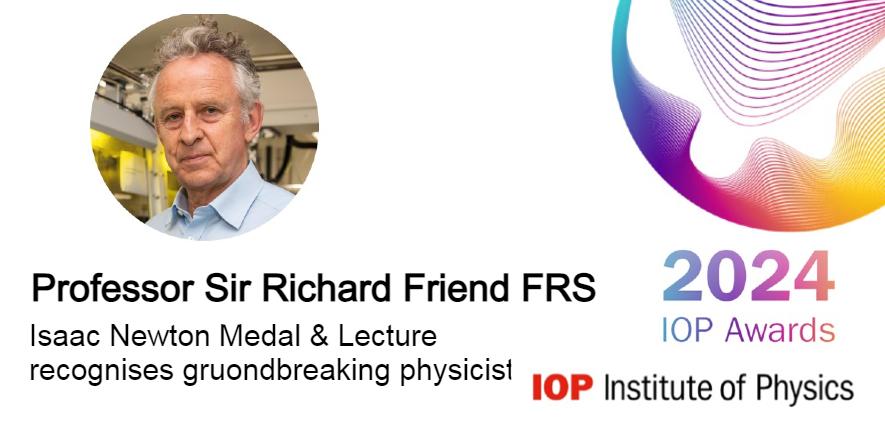
Professor Sir Richard Friend FRS, Director of Research at the Cavendish Laboratory, has been awarded the 2024 Institute of Physics Isaac Newton Medal and Lecture, the most prestigious award of the IOP which recognises groundbreaking physicists.
The award honours Sir Richard for his pioneering and enduring work on the fundamental electronic properties of molecular semiconductors and in their engineering development, particularly for use in LEDs and solar cell technology.
Throughout his career, spanning decades, Friend and his team made transformative breakthroughs in creating thin-layer devices using organic materials, showing that these materials could work effectively, even when they weren't perfectly structured—unlike traditional inorganic materials. This innovation opened the door to new uses of thin-film transistor arrays that can be used in flexible electronics, including displays for e-readers and LCD screens.
After the discovery that semiconducting polymers could also be used in light-emitting diodes (LEDs), Friend went on to co-found Cambridge Display Technology to develop polymer LED technology for displays. The company is now part of the Sumitomo Chemical Company and supports a fully commercialised technology.
"I am immensely proud of this award and the recognition of our work. Our Cambridge group helped set the framework for the field of molecular semiconductors, showing new ways to improve how these materials can separate charges and emit light. But we are not done just yet!," Professor Sir Richard Friend, Department of Physics, Cavendish Laboratory
The Institute of Physics (IOP) is the professional body and learned society for physics, and the leading body for practising physicists, in the UK and Ireland. It is one of the largest physical societies in the world.
Its annual awards proudly reflect the wide variety of people, places, organisations and achievements that make physics such an exciting discipline.
The IOP awards celebrate physicists at every stage of their career; from those just starting out through to physicists at the peak of their careers, and those with a distinguished career behind them. They also recognise and celebrate companies which are successful in the application of physics and innovation, as well as employers who demonstrate their commitment and contribution to scientific and engineering apprenticeship schemes.
Read the full Department of Physics, Cavendish Laboratory article

